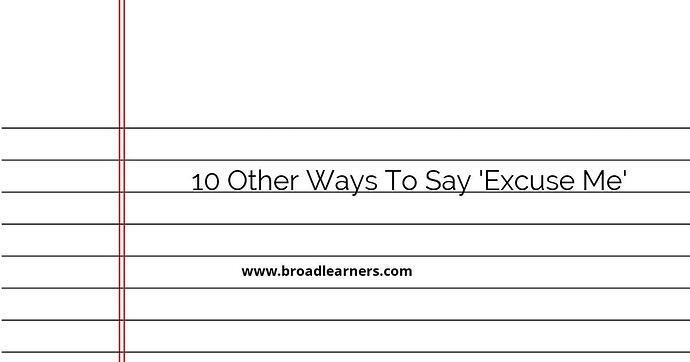'Excuse me' is a polite phrase that we use to get someone's attention, apologize, or ask for permission. However, there are several alternative phrases you can use to convey the same meaning. Here are 10 other ways to say 'excuse me':
- Pardon me
- Sorry for the interruption
- May I have a moment?
- Forgive me for bothering you
- Allow me to get your attention
- Could I have your attention, please?
- May I interrupt for a moment?
- Apologies for the inconvenience
- Can I have a word with you?
- Excuse my interruption
Let's explore each alternative in more detail:
1. Pardon me
'Pardon me' is a polite way of saying 'excuse me' when you want to apologize or ask for forgiveness for interrupting or causing inconvenience. It is commonly used in formal situations or when addressing someone of higher authority.
Example: 'Pardon me, but could I ask you a question?'
2. Sorry for the interruption
'Sorry for the interruption' is a phrase used to acknowledge that you are interrupting someone and express regret for doing so. It is commonly used in professional settings or during meetings.
Example: 'Sorry for the interruption, but I have some important information to share.'
3. May I have a moment?
'May I have a moment?' is a polite way to ask for someone's attention or permission to speak with them. It is often used when you need to discuss something important or have a brief conversation.
Example: 'May I have a moment of your time to discuss the project?'
4. Forgive me for bothering you
'Forgive me for bothering you' is a humble way to apologize for interrupting or inconveniencing someone. It is used when you need to approach someone with a request or question but are aware that you might be disturbing them.
Example: 'Forgive me for bothering you, but could you help me with this issue?'
5. Allow me to get your attention
'Allow me to get your attention' is a respectful way to ask someone to listen or pay attention to you. It is commonly used in formal or professional settings when you need to address a group or individual.
Example: 'Allow me to get your attention for a moment to discuss the upcoming event.'
6. Could I have your attention, please?
'Could I have your attention, please?' is a polite and direct way to request someone's attention. It is commonly used in public settings or when addressing a large group of people.
Example: 'Could I have your attention, please? We need to go over some important information.'
7. May I interrupt for a moment?
'May I interrupt for a moment?' is a polite way to ask for permission to briefly interrupt someone's conversation or activity. It is used when you need to speak with someone urgently or have an immediate question.
Example: 'May I interrupt for a moment? I have some urgent news to share.'
8. Apologies for the inconvenience
'Apologies for the inconvenience' is a phrase used to express regret for causing inconvenience to someone. It is commonly used in customer service or when addressing a situation where you have inconvenienced someone.
Example: 'Apologies for the inconvenience, but the elevator is temporarily out of service.'
9. Can I have a word with you?
'Can I have a word with you?' is a polite way to request a private conversation with someone. It is often used when you need to discuss a sensitive or confidential matter.
Example: 'Can I have a word with you in private regarding the upcoming project?'
10. Excuse my interruption
'Excuse my interruption' is a formal way to apologize for interrupting or intruding on someone's conversation or activity. It is commonly used in professional settings or when addressing someone of higher authority.
Example: 'Excuse my interruption, but I have some important information to share.'
These alternative phrases can help you communicate politely and effectively in various situations where you might need to get someone's attention, apologize, or ask for permission. Choose the phrase that best suits the context and level of formality.
Did I miss anything? Respond below
